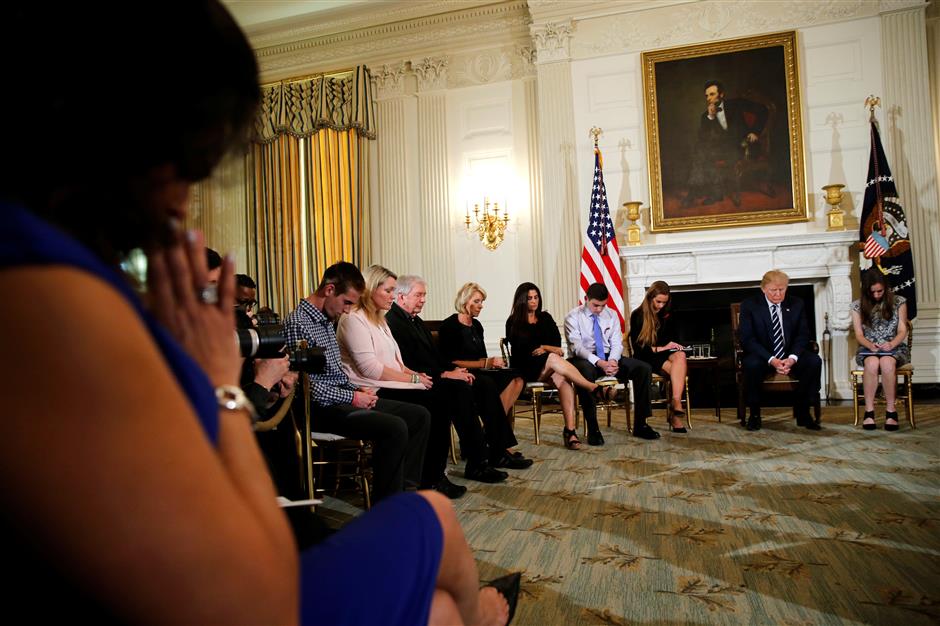Trump says arming teachers could help prevent school massacres

US President Donald Trump bows his head in prayer with participants at a listening session with Marjory Stoneman Douglas High School shooting survivors and students at the White House in Washington, US, on February 21, 2018.
US President Donald Trump said on Wednesday that arming teachers could help prevent massacres like last week's mass shooting at a Florida high school, voicing support for an idea backed by the National Rifle Association gun rights group.
Trump made the comment during an emotional hour-long White House meeting with students who survived the Florida shooting and a parent whose child did not. Hundreds of students joined scattered protests across the country on Wednesday, including in Washington, Chicago and Pittsburgh.
The Republican president, who has championed gun rights and was endorsed by the NRA during the 2016 campaign, said he would move quickly to tighten background checks for gun buyers and would consider raising the age for buying certain types of guns.
He spoke at length about how armed teachers and security guards could frighten off potential school shooters and prevent student deaths.
"If you had a teacher ... who was adept at firearms, it could very well end the attack very quickly," said Trump.
The attack at Marjory Stoneman Douglas High School in Parkland, Florida, where 17 students and educators were slain on February 14 by a gunman with an AR-15 semi-automatic assault rifle in the second-deadliest shooting at a US public school, has revived the long-running US debate over gun rights.
The US Constitution protects the right of Americans to bear arms, a right fiercely defended by Republicans. But Trump has been under pressure to act.
Some of the participants at the meeting indicated support for Trump's idea of arming teachers. Others were opposed.
Mark Barden, whose son was killed in the 2012 Sandy Hook Elementary School shooting in Connecticut, said his wife, Jackie, a teacher, "will tell you that school teachers have more than enough responsibilities right now than to have to have the awesome responsibility of lethal force to take a life.
"Nobody wants to see a shootout in a school," Barden said.
After the Sandy Hook shooting, a task force backed by the NRA recommended more armed guards and teachers in schools.
Trump listened intently to ideas from about 40 people, including those from six students who survived the Florida shooting.
"I don't understand why I can still go in a store and buy a weapon of war, an AR," said Sam Zeif, 18, sobbing after he described texting his family members during the attack.
"Let's never let this happen again, please, please," Zeif said.
Andrew Pollack, whose daughter Meadow Pollack, 18, was killed, shouted: "It should have been one school shooting and we should have fixed it. And I'm pissed - because my daughter - I'm not going to see again."
Trump sat in the middle of a semi-circle in the White House State Dining Room. Photographers captured images of his handwritten note card with questions like "What would you most want me to know about your experience?" and "I hear you."
Protests
Before Trump's meeting, students across the United States walked out of classes in sympathy protests, including hundreds of teens from the Washington suburbs who gathered at the White House.
"I came out here because I don't feel safe in my school," said Allyson Zadravec, 15, of Northwood High School in Silver Spring, Maryland. "I want to make sure that everyone who can do something about it hears that I don’t feel safe in my school.”
In the Florida state capital, Tallahassee, students demanded that lawmakers restrict sales of assault rifles. Some wore T-shirts and carried signs reading: "We call B.S.," one of the slogans of the movement started by the survivors.
Investigators said the assault was carried out by 19-year-old former Stoneman student Nikolas Cruz, who purchased an AR-15 nearly a year ago. Police charged Cruz, who had been kicked out of the school because of disciplinary problems, with 17 counts of premeditated murder.
"Nikolas Cruz was able to purchase an assault rifle before he was able to buy a beer," said Laurenzo Prado, a Stoneman student, referring to a Florida law that allows people as young as 18 to buy assault weapons. "The laws of the country have failed."
Lawmakers in Tallahassee said they would consider raising the age limit to 21, the same standard for handguns and alcohol, although the state Senate on Wednesday opted not to take up a gun control measure.
Trump also said he was open to looking at age limits, among other measures, and lamented the closure of many mental institutions to help assess violent people.
"There's no ... middle ground of having that institution where you had trained people that could handle it and do something about it and find out how sick he really is," Trump said.
Trump on Tuesday directed the Justice Department to work on a regulation that would effectively ban "bump stocks," an accessory that enables a rifle to shoot hundreds of rounds a minute.
Last October, a retired real estate investor and high-stakes gambler used multiple assault rifles equipped with bump stocks to kill 58 people at a Las Vegas outdoor concert, the deadliest attack by a single gunman in US history. Bump stocks have not played a prominent role in other recent US mass shootings.
The NRA opposes an outright ban on bump stocks but has said it would be open to restrictions on the devices.
Senate Democratic leader Chuck Schumer urged Trump to back legislation, instead of a regulation, on bump stocks.















